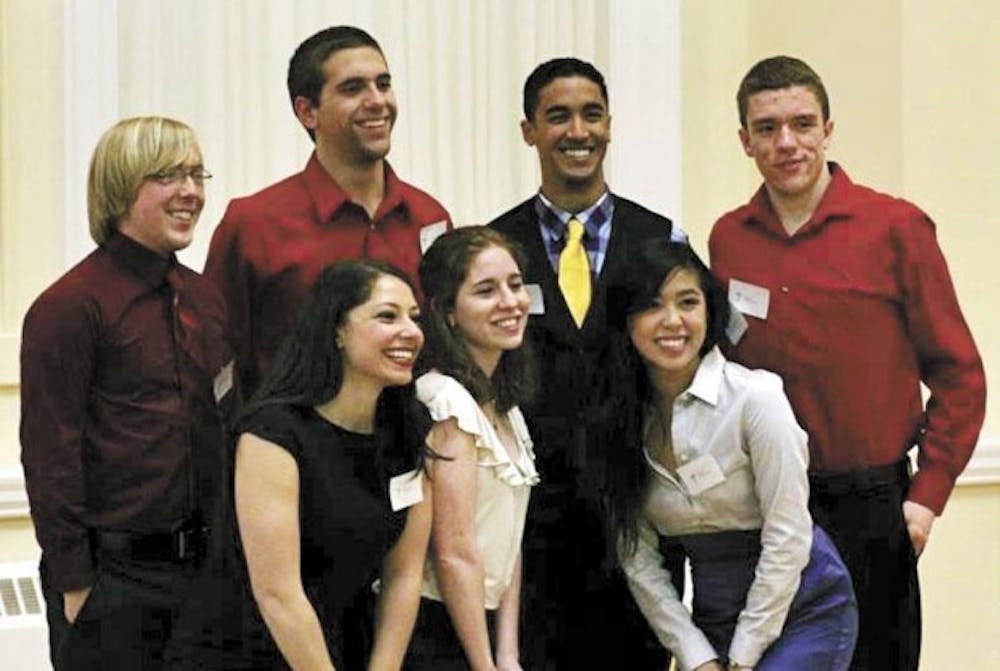Alpha Epsilon Delta (AED) was almost shut down in 2010.
The pre-health honor society, which was still SA-affiliated, had only three nationally inducted members and was only started to "crawl back up" that year, said AED President Shanelle Raugh, a biochemistry and psychology double major.
Now, the club consists of dozens of members who help each other prepare for professional health schools after graduation. The club has made substantial progress. It boasts 30 to 50 general and nationally inducted members.
AED is a prestigious pre-health honor society that is nationally recognized. Its chapter at UB was founded 36 years ago, according to AED Special Events Coordinator Ryan O'Connor, a junior biomedical sciences major.
The society focuses on getting pre-health undergraduates ready for application to professional health schools, said AED Secretary Tim Hansen, a senior biological sciences major.
"We do anything we can to help them strengthen their application," Hansen said. "A common misconception is that when people hear pre-health, they just think of pre-medical [students] ... But our club is for anyone who wants to be in the healthcare field."
In order to join AED, pre-health students must have an overall GPA of 3.3 and a science GPA of 3.2, O'Connor said. Additionally, they need letters of recommendation and must complete a short essay on top of a short interview process conducted by e-board members.
Members can opt to become nationally inducted from their sophomore year onward. It is a route the "majority" takes, according to Raugh. She believes AED will only comprise nationally inducted members in the future.
The club frequently invites speakers who have been in the healthcare field for 20 to 30 years to its bi-weekly meetings so its members can get more perspectives, according to Hansen. This semester, the club invited a heart surgeon as a guest speaker. They plan on inviting a neurosurgeon to speak during the spring semester.
David Bratton, a junior biomedical sciences major and AED SA liaison, emphasizes the club's diversity of pre-health students.
"We also try to work in conjunction with pre-health clubs like the Association for Pre-Medical Students and the Pre-Dental Association just to provide a better sense of unity between everyone who's working toward a health-related field," Bratton said.
Chris Becker, a junior biochemistry major and AED historian, wants to go to dental school, unlike his fellow e-board members who are preparing for medical school.
"I did a lot of shadowing in various areas during my freshman year and after all of that, I decided on dentistry," Becker said. "It may be simpler than a lot of areas of medicine [but] I like the idea that someone comes in with a problem ... and I fix it and they're better."
Becker thinks it is important to network with people who are interested in health care as it would be a "narrow path" for him if he were to only be associated with those going to dental school. AED provides him with just that.
Hansen described AED as an academic and social club. They're all "shooting for the same goal" upon graduation - to get into professional health schools.
The club recently held its annual pre-health symposium, which had a panel of speakers that included doctors, dentists, pharmacists and physician assistants, according to Raugh. It provided attendees with the opportunity to raise questions in terms of health care.
"Getting a perspective from someone that actually does what you want to do is one of the biggest things ever," Bratton said. "Being able to speak with someone like that [helps] you figure out whether you can be a part of that."
Raugh said the club's overall mission is to support pre-health students in their endeavors to professional health schools.
Hansen believes they have achieved this goal "pretty well," especially with the successful implementation of their new program called "Pre-health Students Connected."
"Upperclassmen serve as mentors to the underclassmen [within] the club and they get paired up based on common interests," Hansen said. "They meet at least once a semester, if not more, and discuss what they're interested in, what they want to do in the future [and] how to get to that spot."
Bratton does not regret his decision to join AED as a junior, albeit considerably later than his peers.
"I didn't know how to prepare myself for medical school," Bratton said. "But after joining this club and attending events and talking to people, I now have a solid idea of what I need to do."
He wants pre-health students to know that AED provides all the information they might need at meetings. The society may have been in an unstable place three years ago, but it is growing and helping more students prepare for their future medical careers.
email: features@ubspectrum.com





